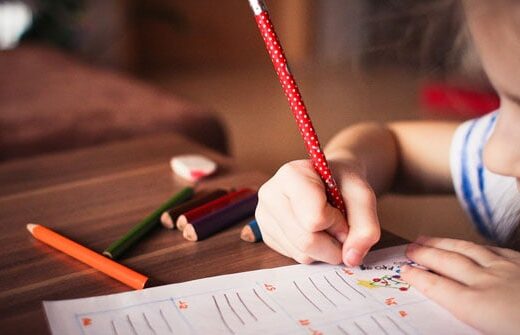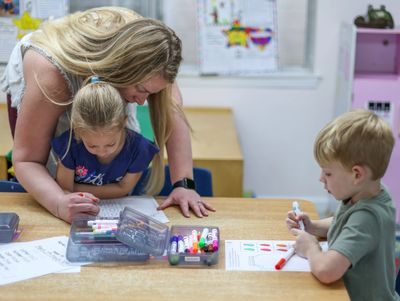Engaging outdoor adventures that enrich Kindergarten learning
The Significance of Interactive Activities in Elementary School Education
Interactive tasks play an important duty in quality institution education. They involve pupils and improve learning outcomes. Via team tasks and hands-on experiments, trainees experience the material in a functional means. This approach provides to varied learning designs and promotes vital skills. The benefits expand past academics. Exploring the much deeper influence of these activities discloses their relevance in forming young learners' futures. What improvements take place when students proactively take part?
Enhancing Engagement Through Interactive Learning
Although conventional mentor techniques have their advantages, interactive discovering substantially boosts student interaction in quality school education. This approach motivates active participation, enabling students to submerse themselves in the discovering process. By using team activities, hands-on experiments, and technology-driven resources, educators create an atmosphere where trainees really feel a lot more connected to the material.
Interactive learning helps with cooperation among peers, promoting communication abilities and team effort. It additionally deals with diverse learning styles, guaranteeing that aesthetic, acoustic, and kinesthetic learners can all grow. In addition, pupils are more probable to keep info when they actively take part, in contrast to passively getting expertise.
This vibrant technique not only makes finding out pleasurable however also instills a feeling of possession in students concerning their academic trip. As they engage with the web content, their curiosity and motivation to find out increase, laying a strong foundation for future scholastic success.
Developing Important Assuming Skills
Interactive learning not just boosts interaction but also works as a catalyst for establishing essential assuming abilities in elementary school trainees. Through activities such as problem-based knowing, debates, and hands-on experiments, students are encouraged to analyze details, evaluate different viewpoints, and develop reasoned conclusions. These interactive experiences call for students to wonder about assumptions, leading them to assume more deeply regarding various topics.

Moreover, interactive tasks often present real-world circumstances that challenge pupils to use their understanding creatively. By steering with these challenges, they discover to determine relevant info and make educated choices. This procedure cultivates not just specific crucial reasoning but also encourages students to verbalize their believed procedures, boosting their ability to communicate successfully. Consequently, interactive learning settings grow a generation of essential thinkers who are much better prepared to tackle intricate issues in their future scholastic and specialist ventures.
Promoting Partnership Among Peers
Fostering collaboration among peers is vital in elementary school education and learning, as it boosts synergy and interaction skills. Engaging in team activities aids pupils develop trust fund and regard for each other, laying the groundwork for effective collaboration. Additionally, analytic together allows trainees to pick up from each various other and develop a collective approach to obstacles.
Team Effort and Interaction Abilities
Reliable synergy and interaction abilities are vital parts of an effective elementary school education. Taking part in interactive tasks encourages trainees to work together, share ideas, and fix issues together. Such experiences promote the growth of critical interaction capabilities, enabling youngsters to reveal their thoughts clearly and pay attention proactively to others. With teamwork, pupils find out to appreciate diverse perspectives, promoting a feeling of community and shared duty. Structured team tasks, whether in academics or innovative jobs, enhance peer communications, showing kids how to bargain duties and solve conflicts. Consequently, these abilities not just add to a favorable classroom atmosphere yet also prepare pupils for future joint ventures in college and the workplace. Overall, team effort and communication are fundamental to alternative growth in grade institution.
Building Trust Fund and Respect
Structure count on and respect among peers serves as a foundation for effective collaboration in quality institution atmospheres. When pupils really feel valued and respected by their classmates, they are a lot more likely to engage actively in group tasks. Interactive tasks, such as team jobs and cooperative video games, supply chances for students to gain from each other, cultivating a sense of neighborhood. This atmosphere urges open communication, allowing trainees to reveal their concepts and viewpoints without anxiety of judgment. As count on constructs, trainees end up being a lot more happy to share responsibilities and support each other's understanding. Eventually, cultivating an ambience of trust and respect improves not just scholastic end results yet also social growth, gearing up trainees with important interpersonal skills for their future undertakings.
Problem-Solving With each other
Joint analytical involves trainees in vital thinking and teamwork, essential skills for their personal and scholastic development. When pupils collaborate to deal with obstacles, they discover to communicate properly, regard diverse viewpoints, and take advantage of each various other's staminas. This procedure improves their capacity to evaluate issues from numerous angles and establish imaginative remedies. Group activities, such as scientific research experiments or math challenges, advertise active participation and foster a sense of area. As pupils collaborate, they likewise develop social skills, learning to jeopardize and discuss, which are crucial for future communications. Inevitably, analytic with each other grows an encouraging learning atmosphere, empowering trainees to take ownership of their education and learning while preparing them for joint undertakings past website here the class.
Encouraging Creative Thinking and Development
Motivating imagination and advancement in elementary school education and learning can be significantly improved with hands-on learning experiences. These activities allow check my site pupils to engage straight with concepts and materials, promoting imaginative reasoning. Furthermore, collaborative team tasks can promote diverse ideas and solutions, better nurturing a creative environment.
Hands-On Discovering Experiences
A multitude of hands-on discovering experiences greatly boosts creative thinking and development in quality school education. Involving pupils in useful activities enables them to apply theoretical understanding in real-world contexts, cultivating much deeper understanding. By controling products and devices, kids develop vital problem-solving abilities and find out to believe outside the box. These experiences inspire inquisitiveness and encourage pupils to explore their interests better. Furthermore, hands-on tasks can bridge different subjects, linking scientific research, art, and math in significant ways. This interdisciplinary technique encourages trainees to see links and believe artistically. Inevitably, hands-on understanding experiences support a generation of pioneers, outfitting them with the skills and confidence required to tackle future difficulties and add to culture in one-of-a-kind means.
Collaborative Team Projects
Hands-on understanding experiences naturally lead to the incorporation of joint team tasks, which play a vital duty in cultivating imagination and innovation in elementary school education and learning. These jobs motivate students to work together, sharing concepts and viewpoints, which enhances problem-solving skills and critical thinking. With partnership, students learn to connect efficiently and respect varied point of views, important skills for their future. Furthermore, team tasks give possibilities for pupils to experiment with different roles, increasing their flexibility and self-confidence. Participating in this cooperative atmosphere allows them to explore their creativity, pressing the boundaries of traditional discovering. Ultimately, collaborative team tasks not only improve the instructional experience however also prepare students for real-world difficulties that require synergy and ingenious thinking.
Building Self-confidence and Freedom
As trainees participate in interactive tasks, they commonly discover opportunities to develop self-confidence and self-reliance. These activities, whether they entail hands-on jobs, role-playing, or analytic jobs, motivate students to take initiative and share their ideas honestly. By participating in such experiences, pupils find out to trust their capabilities and choose without depending only on support from teachers or peers.
Interactive tasks cultivate a sense of ownership over knowing. They develop crucial believing abilities and resilience when students tackle obstacles collaboratively or separately. This procedure not only improves their understanding of the subject but likewise encourages them to take dangers in their knowing journey.
As they navigate various interactive circumstances, students gradually dropped their self-doubt, leading the way for boosted self-esteem - Grade School. Eventually, these tasks play an important role in nurturing independent and certain students, outfitted to deal with future scholastic and individual difficulties
Developing a Positive Class Setting
While promoting a positive class atmosphere is important for reliable learning, it requires willful effort from instructors to develop a room where trainees feel risk-free, respected, and involved. A favorable environment motivates collaboration, permitting students to reveal themselves without concern of judgment.
Educators can achieve this by establishing clear browse around this site expectations, advertising common respect, and identifying private payments. Including interactive activities further boosts involvement, making discovering more dynamic and pleasurable.
In addition, a caring environment sustains social-emotional advancement, as pupils find out to navigate relationships and resolve problems. Educators play an important role in modeling favorable behavior and enhancing a society of kindness and inclusivity.
Regularly Asked Concerns

Exactly How Can Parents Support Interactive Learning in the house?
Parents can sustain interactive understanding in the house by offering engaging materials, urging hands-on jobs, including instructional games, fostering discussions, and developing a nurturing atmosphere that advertises interest and expedition in their kids's finding out experiences. (Private Grade School Peoria)
What Sorts Of Interactive Activities Are The Majority Of Efficient?
Hands-on tasks, joint video games, role-playing situations, and educational technology applications are among one of the most reliable interactive tasks. These involve students, improve vital assuming skills, and advertise synergy, eventually promoting a much deeper understanding of different topics.
Exactly How Do Interactive Tasks Accommodate Various Discovering Styles?
Interactive tasks engage visual, acoustic, and kinesthetic learners by including diverse methods. These activities promote understanding with hands-on experiences, joint discussions, and aesthetic help, enabling pupils to absorb information according to their recommended knowing design.
What Are the Costs Related To Carrying Out Interactive Tasks?

Carrying out interactive tasks incurs costs such as materials, training for educators, modern technology upgrades, and prospective center adjustments. Budget plan constraints can likewise influence the frequency and variety of activities provided to pupils in academic settings.
Exactly How Can Teachers Examine the Impact of Interactive Learning?
Educators can evaluate the influence of interactive knowing with observations, pupil feedback, performance metrics, and comparative analysis of examination scores before and after implementation, making certain an extensive understanding of interaction and expertise retention renovations.
Via tasks such as problem-based understanding, arguments, and hands-on experiments, students are motivated to examine info, examine different viewpoints, and develop reasoned verdicts. Interactive tasks frequently present real-world circumstances that test students to apply their understanding artistically. Involving in interactive activities urges students to work together, share ideas, and address issues together. Interactive tasks, such as team jobs and cooperative games, give possibilities for students to discover from one another, promoting a sense of area. As pupils involve in interactive activities, they often find chances to build self-confidence and self-reliance.